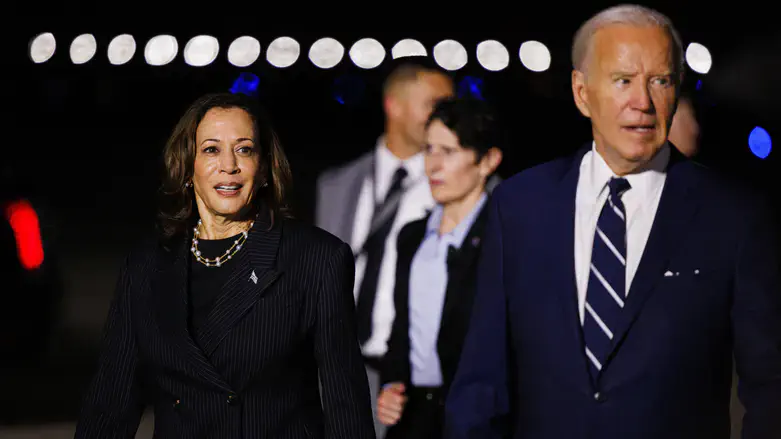
US President Joe Biden and Vice President Kamala Harris were told by their national security team on Monday that it is still unclear when Iran and Hezbollah are likely to launch an attack against Israel and what specifically the attack might entail, three US officials told Barak Ravid of Axios.
Biden administration officials say they are working to prepare for countering the possible attacks and mobilizing diplomatic pressure on Iran and Hezbollah to try to minimize their retaliation for the eliminations of Hamas political leader Ismail Haniyeh in Tehran and Hezbollah's top military commander in Beirut.
While Axios reported on Sunday that Secretary of State Antony Blinken had told his G7 counterparts that Iran and Hezbollah could attack Israel as soon as the next 24-48 hours, Biden and Harris were told during Monday’s meeting by the National Security Council that the assessment was more nuanced.
The officials said Biden and Harris were told US intelligence expects a scenario involving two waves of attacks — one from Hezbollah and one from Iran and several of its other proxies.
However, it was still unclear to US intelligence who is going to attack first and what kind of attack they are going to conduct, the officials said.
One US official said intelligence indicates the response by Iran and Hezbollah is still a "work in progress" and both are undecided about what exactly they want to do.
In a statement published after the meeting, the White House issued said, "Today, President Biden and Vice President Harris were briefed by the national security team on developments in the Middle East. The briefing focused on the threats posed by Iran and its proxies to Israel and to US servicemembers in the region. The President and Vice President were briefed on the attack at Al Asad Air Base in Iraq. They discussed the steps we are taking to defend our forces and respond to any attack against our personnel in a manner and place of our choosing.”
"They were updated on US military efforts to support the defense of Israel should it be attacked again. They were also briefed on continued diplomatic efforts to de-escalate regional tension and to bring the ceasefire and hostage release deal to a conclusion. The President and Vice President will continue to receive regular updates from their national security team," the statement concluded.
State Department spokesperson Matthew Miller said in a briefing with reporters on Monday that the Biden administration conveyed a message to Iran that the US will defend Israel if it is attacked.
"We don't think such an attack is inevitable and we are trying to prevent it," Miller said.
On Sunday, an Israeli official told NBC News that Israel is bracing for a potential multiday attack by Iran and Hezbollah following the elimination of the two senior terrorists.
The official said Israel fears waves of missiles and drones could be fired over several days in response to the killing of Hamas political leader Ismail Haniyeh and Hezbollah commander Fuad Shukr.
“They’ll just try to wear us out,” the official told NBC.
US officials told CNN this past Thursday that the US is expecting that an Iranian attack in retaliation for the elimination of Haniyeh may be similar to the barrage of ballistic missiles and drones launched against Israel on April 13.
The officials said that this time the attack could be larger and more complicated than before, including the possibility of a coordinated attack with Iranian proxies from multiple directions.
Iran's Parliament Speaker, Mohammad Baqer Qalibaf, said on Sunday that the country's response to the elimination of Haniyeh would be "crushing and smart".
